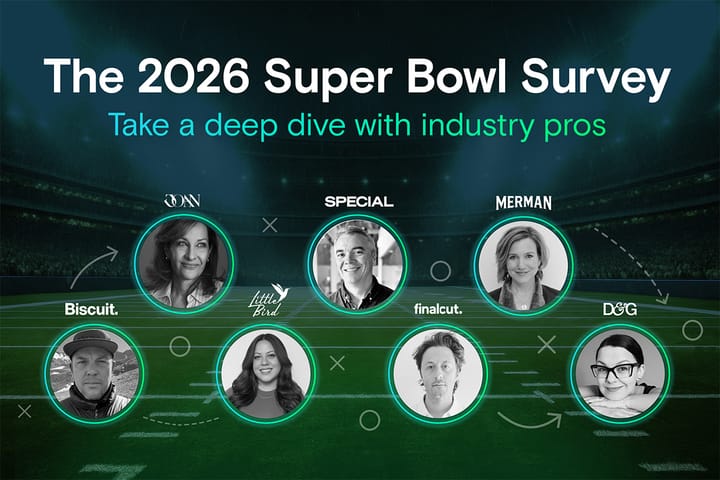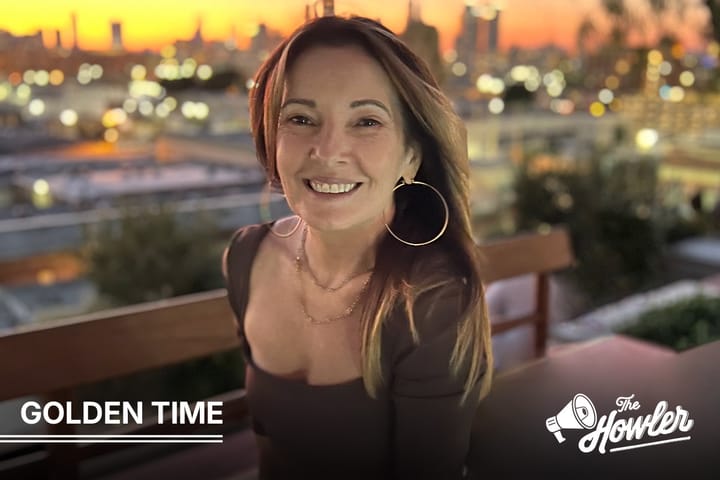DNY’s Miriam Franklin on What it Takes to be a Great Producer

Want to talk about the career arc of the aspiring agency producer? There’s no better source to connect with than Miriam Franklin.
Currently EVP and Head of Integrated Production at Attivo Group, North America, Miriam oversees production for both DNY (better known as Deutsch New York) and Hill Holliday in Boston; both shops have long traditions of doing groundbreaking broadcast work. Known as an award-winning leader who’s spent her career creating high-profile campaigns for top ad agencies worldwide, she's produced across every medium and budget, working with celebs, athletes, real people, artists, kids, and animals – sometimes all at once.
At Attivo Group, she oversees production across all clients while managing in-house studios Great Machine and Brigade. Her career spans award-winning campaigns for Reebok, State Farm, Apple Music, AT&T, Jeep, and McDonald's, among others - including one of the top ten Super Bowl spots of all time, “Reebok Presents Terry Tate Office Linebacker.”
Beyond advertising, she's produced original programming such as the TNT series “State Farm Presents Neighborhood Sessions,” that featured hour-long docu-music specials with such artists as J Lo, Dave Matthews, and Usher, among other long-form projects.
Earlier in her career, Miriam served as Director of Content Production at Translation, and has freelanced for a number of top agencies, including Wieden + Kennedy. Throughout, she’s always had an eye on helping her clients navigate the ever-changing cultural landscape while mentoring the next generation of producers, sharing her hard-won expertise with generosity and candor.
At the recent Simian/1Park9 Heads of Production roundtable, she championed the role of the mentor in the agency production ranks. The Howler reached out to her to elaborate on this vastly important issue. Here’s what she had to tell us.
Much was said at our gathering about the difficulties of mentoring younger producers in today’s hybrid environment. How do you see mentorship having changed the most since you started in agency production?
Miriam: The transformation has been profound. When I started, production departments were more robust ecosystems where you were constantly surrounded by producers and business affairs managers at varying experience levels. Learning happened organically – you could listen in on calls, observe how senior producers navigated challenging client conversations, and absorb the nuances of vendor relationships simply by being present and paying attention.
The pandemic dealt a devastating blow to this natural mentorship model. Young producers lost that constant, immediate access to teammates and the spontaneous knowledge exchange that happens when you’re physically present. However, our hybrid approach at DNY is helping restore some of that magic. With everyone together three days a week, we're recreating opportunities for that “sponge-like” learning environment.
As a leader, I’ve had to become much more intentional about mentorship. I make sure I’m available both in-person and remotely, actively checking in on my producers and encouraging them to build relationships across departments and with our vendor partners. The informal learning that once happened naturally now requires deliberate cultivation.

DNY has staked out a position as being a driver of social engagement, and your recent presence in Cannes was focused on the creator and influencer community. How do you staff these projects, and what kind of training or learning opportunities do they present for your more junior producers?
Miriam: These projects require a completely different staffing philosophy than traditional advertising production. Speed, efficiency, and deep native knowledge of the social landscape are paramount, so we deploy lean, agile teams – typically a two or three person ‘hit squad’ consisting of a social strategist/content creator paired with a producer/content creator.
These units operate semi-independently from our brand teams while maintaining constant alignment to ensure all social content ladders up to core brand messaging and personality, even when daily output doesn’t reflect a specific campaign.
For junior producers, especially those with content creation and editing skills, this environment is invaluable. They’re not just observing the process; they have a real voice in content development. It’s hands-on learning at its finest, allowing them to expand their skill sets while seeing immediate, measurable results. The fast-paced nature teaches them to think on their feet and adapt quickly to platform nuances and audience behaviors.
Tell us about SOCI Studio, your in-house content division. How does it operate? What does it represent in terms of a new approach to making brand content? And how does it differ from other in-house production arms?
Miriam: It’s important to clarify that SOCI Studio isn’t a traditional in-house production arm – it’s a social-first practice that strategizes, develops, and creates original content for clients. This distinction is crucial, because most in-house production arms focus primarily on executing creative that was developed through traditional brand approaches.
SOCI represents a fundamental shift in how we approach brand content; it’s social-native from conception, not an afterthought or adaptation of traditional advertising. While we have a separate in-house production/post division, Great Machine, that handles brand-level execution, SOCI services clients differently. It can tap into Great Machine’s resources when needed, but operates with its own methodology, timeline, and creative philosophy that’s built for the social ecosystem.
This approach recognizes that effective social content requires different strategic thinking, production methods, and success metrics than traditional advertising. It’s not about making smaller versions of TV spots – it’s about creating content that feels native to each platform and genuinely engages audiences where they are.

Are there recent SOCI Studio projects that would be good examples of how younger producers are expanding their skills?
Miriam: A perfect example is our recent CityMD social video series. The entire project was developed by the SOCI team and shot and edited by one of our producer/creators alongside a social strategist/creator.. This wasn’t just an assist or execution role. They partnered as the primary content creators, responsible for translating strategic concepts into compelling visual narratives.
What makes SOCI so valuable for skill development is that team members with additional creative capabilities actually get to use them on real client work. They’re not just learning about content creation in theory, they’re honing their skills through real-world applications and seeing tangible results. The CityMD videos have garnered over 40 million views to date, giving our producer concrete proof of their impact and capabilities.
This hands-on approach accelerates learning in ways traditional production roles simply can’t match. When you’re responsible for the entire creative process from concept to delivery, you develop a more comprehensive understanding of what makes content effective.
@city_md Dr. Caba is answering the real questions we have about women’s health!
♬ original sound - CityMD - CityMD
DNY's SOCI produced this TikTok campaign for City MD using next gen production talent.
Is there an active or organized mentorship program in place at DNY, or is this done in an informal manner? How do you go about making sure that knowledge and expertise is being shared between your more veteran producers and junior ones?
Miriam: Interestingly, we were just discussing formalizing our mentorship approach, but currently, it operates organically within our small but mighty team structure. Everyone works together daily, creating natural learning opportunities.
I’ve cultivated a culture where asking questions isn’t just acceptable, it’s encouraged and expected. I tell my team there’s no shame in raising your hand for clarity or help; in fact, it’s how we all grow. Junior producers get extensive hands-on experience, often working side-by-side with senior producers to absorb not just technical skills but also the strategic thinking behind decision-making.
When producers encounter unusual challenges, I encourage them to share their experiences with the entire team. This serves dual purposes: it creates learning moments for everyone and often surfaces solutions or approaches the original producer hadn’t considered. No one operates in isolation; we all need sounding boards and gut-check partners.
My philosophy is complete accessibility. No question is too trivial, and I make this clear to my team. Too often, producers feel pressure to have all the answers or solve every challenge independently. I work to dismantle that harmful mindset, because it stunts professional growth and ultimately hurts the quality of our work.
What kind of training did you get when you were coming up in the agency production ranks? Similarly, what’s been your role in serving as a mentor during the course of your career?
Miriam: I was fortunate to come up during an era when production departments were more robust and there was genuine investment in developing talent. Time was allocated for skill development and career progression, which feels almost luxurious by today's standards.
Throughout my ascent, I maintained an insatiable curiosity and asked countless questions, especially when faced with unfamiliar tasks. I learned that people genuinely want to share their knowledge – they want to teach you if you’re genuinely open to learning. I had several exceptional mentors, each with distinct styles and approaches, which allowed me to develop my own methodology by taking the best elements from each.
This became a foundational lesson I now impart to my producers: observe and listen to everyone, never stop asking questions, and ultimately decide what works best for your style and strengths. I also emphasize that the moment you think you know everything, or don’t need assistance, is the moment you should hang it up. Production is constantly evolving; new technologies, platforms, and methodologies emerge regularly. There's always something new to learn and new people to learn from. As a mentor, I try to model this continuous learning mindset while creating safe spaces for experimentation and growth.
At our roundtable, we talked about the issues senior production leaders see when dealing with their younger staffers, often relating to how they communicate with the agency team and vendors, their level of technical knowledge, their ability to manage the on-set or in-session experience, etc. What do you tell your younger people in terms of helping guide or steer their professional development? What's the biggest challenge in helping them adequately learn the ropes?
Miriam: The reality is harsh: most people entering production today are essentially thrown into the deep end with no lifeguard on duty. Budget constraints and staffing limitations have eliminated the gradual skill-building that previous generations enjoyed.
I focus on three fundamental pillars with my staff: empathy, context, and crystal-clear communication, both internally with agency colleagues and externally with production partners. I emphasize that admitting when you don’t know something isn’t a weakness; it’s the foundation of becoming a valuable partner and facilitator.
I personally display this behavior constantly, especially as new technologies and tools emerge. No one can be an expert in everything, but if you consistently ask questions to learn and understand, you build credibility and competence simultaneously.
The biggest challenge is helping them understand that being a great producer isn’t about having all the answers, it’s about knowing how to find them, asking the right questions, and facilitating solutions. It’s also about reading situations, understanding motivations, and communicating in ways that move projects forward effectively. We’re essentially compressing what used to be years of gradual learning into months of intensive experience, which requires much more intentional guidance and support.

Finally, let's talk about AI: Our roundtable's take was basically ‘master it before it masters you.’ How do you see the next generation of producing talent mastering this technology? How will it help them produce great work?
Miriam: Like any transformative tool, AI is here to serve the work and enhance great storytelling, not replace the human elements that make content compelling. We have a big AI exploration going on across DNY and the Attivo Group North America, with dedicated workstreams across, strategy, creative and production. We’re already finding it can speed us up and, importantly, we can use the time savings to allow for greater time on creative ideation.
I’m encouraging my teams to actively experiment with AI tools to understand their capabilities and limitations firsthand. We’re also fostering relationships with production partners who are at the forefront of AI integration, learning from their experiences and understanding how these tools can be most effectively utilized across different project types. The key is maintaining a critical eye – questioning AI outputs and double-checking results rather than accepting them blindly.
What’s exciting is seeing AI’s evolution across all facets of production, from pre-production planning and script development to post-production and distribution optimization. For the next generation of producers, mastering AI means understanding both its potential and its boundaries.
The producers who will thrive are those who learn to leverage AI for efficiency and ideation while maintaining their human judgment for strategic thinking, relationship management, and creative problem-solving. AI can handle many tactical elements, but the art of production – reading a room, managing personalities, making creative judgment calls under pressure – that remains distinctly human.
The goal isn’t to become AI experts, but to become excellent producers who use AI as one of many tools in their arsenal.



